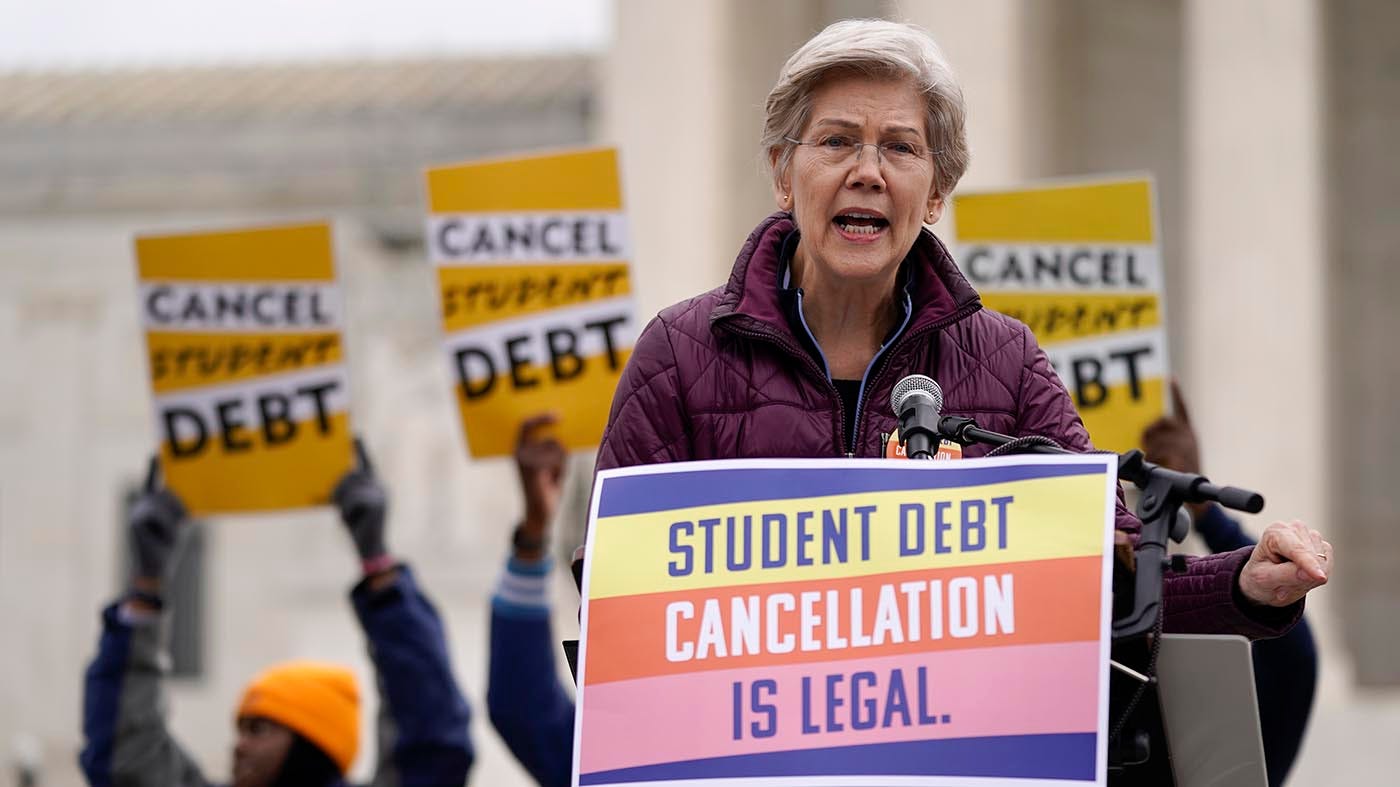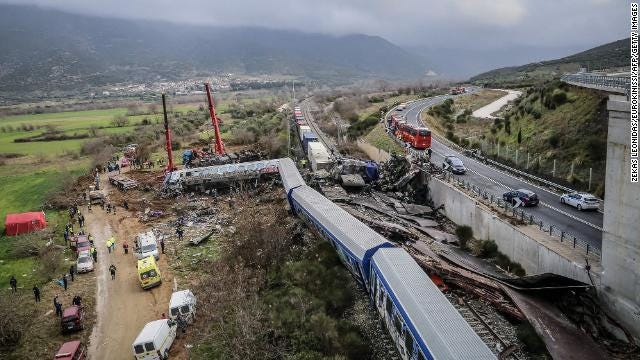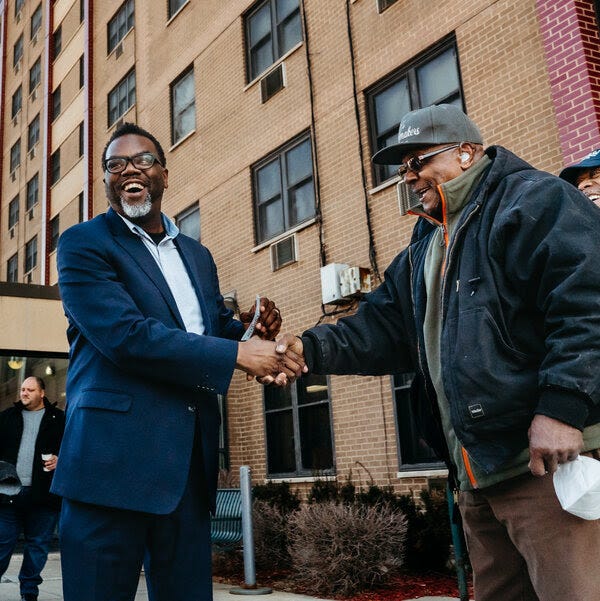The Full Belmonte, 3/1/2023
Debt relief endangered
A demonstrator in favor of canceling student debt stands outside the Supreme Court today while oral arguments took place. Photo: Valerie Plesch/Bloomberg via Getty Images
“President Biden's plan to cancel billions of dollars of student loan debt appears in jeopardy.
During oral arguments today in two cases challenging the plan, the Supreme Court's conservative majority appeared skeptical that he has the legal authority to offer the far-reaching debt relief, Axios' Erin Doherty reports.
Chief Justice John Roberts and other conservative justices invoked the ‘major questions doctrine,’ which holds that the executive branch needs explicit congressional approval to act on the biggest issues.
The court has used that doctrine lately to strike down several Democratic priorities, including environmental regulations and COVID vaccine mandates.
Solicitor General Elizabeth Prelogar argued that the plan was legal under the HEROES Act of 2003, which allows the education secretary to ‘waive or modify’ student financial assistance programs when there's a national emergency.
Both former President Trump and Biden have used the statute to pause student loan payments since the outset of the COVID pandemic.
Since Biden announced the plan last August, 26 million people applied for student loan debt relief. More than 16 million of those borrowers' applications were fully approved.
The program has been on hold since November, after a Texas judge struck it down.” [Axios]
© Associated Press / Patrick Semansky | Sen. Elizabeth Warren (D-Mass.) speaks in support of student debt cancellation on Tuesday.
SCOTUS skeptical about student loan forgiveness
“For the 26 million borrowers who applied for student loan forgiveness, the prospect of debt relief just got murkier. The Supreme Court’s conservative justices on Tuesday cast doubt on President Biden’s debt forgiveness plan during oral arguments, hindering the administration’s plan to wipe out more than $400 billion in student debt because of the emergency economic changes of the coronavirus pandemic.
Biden initially was reluctant to use executive power to forgive student loan debt. He agonized for months over equity versus giveaways, fueling inflation and questions of fairness to those who had borrowed and honored their loan obligations in the past.
Eventually, the Biden administration moved to forgive applicants’ debts under current law, offering up to $20,000 per federal student loan borrower. Six Republican-dominated states — Nebraska, Missouri, Arkansas, Iowa, Kansas and South Carolina — and two individuals sued to stop the president’s plan (The Hill and The New York Times).
In the first of two challenges to the program, Biden v. Nebraska, a majority of the justices appeared skeptical that Congress gave clear enough authorization for the Biden administration to forgive billions of dollars in student debt. Chief Justice John Roberts indicated that the administration had violated separation of powers principles by acting without sufficiently explicit congressional authorization to undertake one of the most ambitious and expensive executive actions in the nation’s history.
We’re talking about half a trillion dollars and 43 million Americans, Roberts said early in the arguments, asking why the court shouldn’t expect Congress to explicitly accept a program of such massive scope (Politico).
The Wall Street Journal: During oral arguments, Roberts questioned the program’s fairness to those without college loans.
As the court prepares to rule on the cases this summer, The Hill’s Lexi Lonas has rounded up the key takeaways from Tuesday’s oral arguments. U.S. Solicitor General Elizabeth Prelogar, arguing on behalf of the administration, told the court the government is “not disputing that this is a politically significant action,” but that the language of the Higher Education Relief Opportunities for Students (HEROES) Act is clear enough to give the Education Department secretary the power to forgive student loans.
The law says that the Education secretary can “waive or modify” federal student financial assistance programs “as the Secretary deems necessary in connection with a war or other military operation or national emergency” — such as the COVID-19 pandemic.
“Congress doesn’t get much clearer than that. We deal with congressional statutes every day that are really confusing. This one is not,” liberal Justice Elena Kagan said.
As the case before the Supreme Court unfolds, student loan borrowers are in limbo about the exact date when they must begin repayments following a three-year pandemic pause (The Hill). Eight of them told New York magazine’s The Cut how student loan relief would change their lives.” [The Hill]
McCarthy defends Carlson’s access to Jan. 6 footage, calls media ‘jealous’
The House speaker has been scrutinized by Democrats and members of the media over the exclusive arrangement with the Fox News host
“House Speaker Kevin McCarthy (R-Calif.) on Tuesday defended his decision to give conservative TV host Tucker Carlson access to roughly 40,000 hours of security footage from the Jan. 6, 2021, attack on the U.S. Capitol, telling reporters that the footage will soon be released broadly and that his office is taking measures to address concerns about security risks.
‘It almost seems like the press is jealous,’ McCarthy said in a one-on-one interview with The Washington Post. ‘And that’s interesting because every person in the press works off exclusives on certain things.’
‘People like exclusives, and Tucker is someone that’s been asking for it,’ said McCarthy, who characterized Carlson’s style of journalism as ‘opinion,’ not news. ‘So I let him come in and see it, but everyone’s gonna get it.’
McCarthy has avoided repeated questions from reporters about his agreement with Carlson since the Fox News host announced last week that his team had access to security footage. Several media organizations, including The Washington Post, sent letters to McCarthy requesting the same access and raising concerns ‘that an ideologically based narrative of an already polarizing event will take hold in the public consciousness.’…” Read more at Washington Post
Ohio toxic train
“Scientists say tests in East Palestine, Ohio, show unusually high levels of some chemicals in the aftermath of a toxic train wreck last month. Nine of the dozens of chemicals that the EPA has been monitoring are higher than would normally be found in the area, according to a group of scientists from Texas A&M and Carnegie Mellon University. The highest levels found in the area were of a toxic chemical called acrolein, the analysis says. Acrolein is used to control plants, algae, rodents and microorganisms. It can cause inflammation and irritation of the skin, respiratory tract and mucous membranes, according to the CDC. In response to angry residents, the EPA said it will continue to monitor the air quality in the area and in people's homes.” [CNN]
Chicago mayor race
“Chicago Mayor Lori Lightfoot lost her reelection bid Tuesday, marking the first time in more than 30 years that Chicago has ditched its mayor. Lightfoot, the first Black woman and first out gay person to serve as the city's mayor, failed to make a top-two runoff amid growing concerns about rising crime in Chicago. Paul Vallas, a longtime public schools chief who ran on a tough-on-crime message, and Brandon Johnson, a Cook County commissioner backed by progressives and the Chicago Teachers Union, will advance to the April runoff, CNN projects. More than 507,000 ballots had been cast by the time polls closed Tuesday, Chicago elections officials said. More mail-in votes will be added to that total as they arrive.” [CNN]
RSV vaccine
“Vaccine advisers to the FDA narrowly voted Tuesday in favor of Pfizer's RSV vaccine for adults over the age of 60, paving the way for approval of the nation's first RSV vaccine, despite some safety concerns. The committee members voted 7-4, with one abstention, that there are adequate data to support the safety and effectiveness of the vaccine for the prevention of a lower respiratory tract disease caused by the respiratory syncytial virus, or RSV, among older adults. The FDA, which typically follows the independent committee's recommendations, is scheduled to decide on approval by May, ahead of RSV's typical winter surge. RSV is a highly contagious virus responsible for an estimated 177,000 hospitalizations and 14,000 deaths per year among adults 65 or older, according to the CDC.” [CNN]
Child care plan required for chip funds
Illustration: Natalie Peeples/Axios
“Chip manufacturing companies that apply for a slice of the billions set aside to build domestic plants will be required to submit a plan explaining how workers will access affordable child care, according to a Commerce Department presentation shared with Axios Markets co-author Emily Peck.
The new requirement is a way for the Biden administration to make progress on expanding child care access after efforts to pass any nationwide policy fell short.
There aren't enough child care workers or facilities in many areas, and costs are unaffordable for people who might want to take these chip-related jobs.
The agency is agnostic on how companies get this done. They could build company-run onsite facilities or outsource to a vendor. Companies could sponsor care directly or provide vouchers, discounts or cash.” [Axios]
The latest on the Murdaugh trial
“One of the most high-profile true crime cases in recent history is playing out in a South Carolina courtroom. Testimony is underway in the double murder trial of disbarred attorney Richard "Alex" Murdaugh, who is charged with killing his wife and son. Murdaugh, part of a South Carolina legal dynasty, was charged with murder in connection to the shooting deaths of his wife, Maggie, and son, Paul. Murdaugh has pleaded not guilty. After the shootings in June 2021, police launched investigations into two other deaths connected to Murdaugh and alleged criminal acts dating back more than a decade.” Read our latest recap from the trial. [USA Today]
Alex Murdaugh gives testimony during his murder trial at the Colleton County Courthouse in Walterboro, S.C., on Thursday, Feb. 23, 2023.
Pool photo by Grace Beahm Alford
Ukraine
“Russian officials today accused Ukraine of launching a spate of attempted drone strikes targeting infrastructure deep inside Russia, including near its capital. Following the alleged attacks, Russia's second-largest city of St. Petersburg closed its airspace and briefly banned incoming flights on Tuesday, according to state media. Meanwhile, Finland has begun construction of barrier fences on its eastern border with Russia. The Finnish border was one of the few entry points for Russians after many Western countries shut their air space and borders to Russian planes in response to the Ukraine invasion. Helsinki later closed its border at the end of last September when Russians tried to flee President Vladimir Putin's ‘partial mobilization’ of hundreds of thousands of citizens to fight in the war.” [CNN]
Police and emergency crews search the wreckage after a train collision in the Tempi Valley near Larissa, Greece.
Greece train crash
“At least 36 people were killed in a train collision Tuesday night in Tempi, central Greece, the Greek Fire Service said. A passenger train was carrying more than 350 people when it collided with a freight train. The two trains involved in the collision were traveling on the same track for many kilometers before the incident occurred, state-owned public broadcaster ERT reported. The passenger train had changed lanes and switched to a cargo track before the collision, according to ERT. The passenger train had been traveling from the capital Athens to Thessaloniki, Greece's second-largest city, following a nationwide carnival that took place over the weekend.” [CNN]
Paternity leave expands — just not in U.S.
Data: World Policy Analysis Center. Chart: Alice Feng/Axios
“More than 120 countries provide some sort of guaranteed paid parental leave for fathers — up from 46 countries in the 1990s, according to a report from the World Policy Analysis Center.
The U.S. isn't one of them.
Though support is growing for paternity leave, there's still a stigma attached to men who take time off to care for their children. Yet studies find that leave provides numerous benefits for the economy, for fathers and for their partners, Axios Markets co-author Emily Peck writes.
The U.S. is also one of just seven countries in the world that does not guarantee paid maternity leave.
The other countries are the Marshall Islands, Micronesia, Nauru, Palau, Papua New Guinea and Tonga.” [Axios]
Tunisians Protest Crackdown on Migrants
“Hundreds of Tunisians have taken to the streets to protest Tunisian President Kais Saied’s anti-migrant crackdown. Saied has claimed that undocumented migrants from sub-Saharan Africa were part of an orchestrated attempt to change Tunisia and has resorted to increasingly xenophobic rhetoric in recent weeks as opposition to his government increases.
There are social media reports of crowds trying to forcibly evict migrants from their homes and police arresting parents fetching their children from daycare. So, too, have there been reports of companies refusing to sell to individuals they believe to be undocumented.
Protesters chanted, ‘No fear, no terror, the street is for the people,’ and claimed solidarity with migrants and with the African continent.
The Guardian reported that the Ministry of Interior appeared to be treading gently with the protesters, taking a ‘deliberately light touch.’
In recent weeks, Saied, who suspended parliament and dismissed the country’s prime minister in the summer of 2021, has moved against his critics. He has called opponents ‘traitors and terrorists,’ had prominent opposition figures arrested, and threatened judges with legal action if they acquitted detainees. Food shortages and a sluggish economy are also cutting into support for the president, who is pushing back against his critics with threats, portraying himself as the guardian of national security while presenting his opponents—and foreigners, especially Black Africans—as security threats.” [Foreign Policy]
“Iran investigating the poisoning of nearly 700 schoolgirls. Hundreds of Iranian schoolgirls are believed to have been exposed to toxic gas since November. ‘It became evident that some people wanted all schools, especially girls’ schools, to be closed down,’ said Iran’s deputy health minister, who later backpedaled, claiming he had been misunderstood.
Iran’s prosecutor general has opened an investigation. No one has died, but dozens have suffered problems like dizziness and fatigue, and public frustration is increasing. Some Iranians suspect that the poisonings are retaliation for the girls’ participation in protests last year, while others believe they are the work of religious hardliners.” [Foreign Policy]
“Zelensky says the situation in Bakhmut is worsening. Ukrainian President Volodymyr Zelensky has said the situation in the eastern Ukrainian city of Bakhmut is becoming ‘more and more difficult.’ For six months, Russians have been trying to take the city. Now, Zelensky said, ‘The enemy is constantly destroying everything that can be used to protect our positions.’ According to reports, fighting has recently intensified, but Ukrainian forces are not showing any intent to withdraw.
Moscow’s governor, meanwhile, has said that a drone that crashed in the Moscow region was sent to try to target civilian infrastructure. Ukraine has not claimed responsibility for such an attack, but Anton Gerashchenko, advisor to Ukraine’s ministry of internal affairs, tweeted out a photo of the drone along with the words, ‘It is more than 500km away from Russian border with Ukraine. Soon Putin might get very afraid to show himself in public as drones can reach far distances.’ Putin, for his part, said Tuesday, ‘We need to beef up our counterintelligence in general, because Western special services have traditionally been very active in relation to Russia.’” [Foreign Policy]
“Opposition parties dispute election results in Nigeria. Bola Tinubu of the ruling All Progressives Congress has been declared the winner of Nigeria’s election, with 37 percent of the vote. Nigeria’s main opposition parties are calling for new elections, alleging that results have been manipulated to support Tinubu. The election has been marred by technical and logistical issues.
‘We demand that this sham of an election should be immediately canceled … We also call for a fresh election to be carried out,’ said Julius Abure of the opposition Labour Party, whose candidate is Peter Obi (the other main candidate was Atiku Abubakar of Nigeria’s People’s Democratic Party). Election officials maintain the elections were fair, saying, ‘Contrary to the insinuation by both parties, results emanating from the states point to a free, fair and credible process.’” [Foreign Policy]
Tinubu during celebrations at his campaign headquarters in Abuja. Photographer: Kola Sulaimon/AFP/Getty Images
“Finland builds border fence with Russia. Finland has started building a 124-mile fence on its border with Russia, a security upgrade from the light wooden fences it has currently. Finland apparently decided to build the fence as a result of a reported increase in Russians trying to flee the country to avoid conscription in their country’s war in Ukraine. Fence construction is permitted under new amendments to its Border Guard Act, which passed in July. Cameras, lights, and loudspeakers are also set to be installed.” [Foreign Policy]
Good morning. After a crime surge, Chicago voters have ousted their current mayor.
Paul Vallas voting in Chicago yesterday.Taylor Glascock for The New York Times
A progressive problem
“Chicago’s mayor race has joined the growing list of evidence that Americans are unhappy about crime.
Lori Lightfoot, the incumbent, yesterday became the first Chicago mayor in 40 years to lose a re-election campaign. Lightfoot — a progressive in her first term — finished third in the initial stage of this year’s campaign, in which nine candidates were trying to qualify for a runoff in April. Lightfoot received only 17 percent of the vote, according to the latest count.
The runoff will be between Paul Vallas, a former head of the city’s school system who ran on a tough-on-crime message, and Brandon Johnson, a progressive county commissioner who previously worked as a teacher and union organizer. Vallas finished with 34 percent of the vote and Johnson finished second with 20 percent.
Brandon Johnson talking to supporters yesterday.Jamie Kelter Davis for The New York Times
Crime in Chicago has surged since the pandemic began, with the number of major crimes 33 percent higher last year than in 2019. The murder rate has fallen from its 2021 peak but only modestly, and robberies and car thefts have kept rising recently. In a recent poll, nearly two-thirds of Chicago residents said that they felt unsafe.
‘Chicagoans are genuinely frustrated by the state of the city, and crime is vastly overshadowing any other concerns,’ Julie Bosman, The Times’s Chicago bureau chief, told me. ‘In a city known for its powerful leaders, it’s unsurprising that a lot of Chicagoans see this as Lightfoot’s failure. Many voters I’ve talked to see this mayoral race as a chance to reset.’
New York and Oregon, too
Crime has been a particularly vexing issue for progressive Democrats, both in Chicago and nationally. After police officers in Minneapolis murdered George Floyd in 2020, progressive activists and politicians called for both reforms to reduce police violence and reduced funding for police departments. Many of the proposed reforms — including body cameras and greater accountability for police misbehavior — are popular, but defunding the police is unpopular even among most Democratic voters, polls show.
It became more unpopular after crime began to soar during the pandemic. Across 27 cities that publicly report crime data, the murder rate last year was 34 percent higher than it had been in 2019, according to the Council on Criminal Justice.
Chart shows 12-month averages. | Source: Council on Criminal Justice
Progressives have struggled to develop a persuasive response. Some have suggested that the crime increase is mostly a right-wing talking point, but the statistics say otherwise. And voters evidently agree with the statistics:
In New York City, Eric Adams won the mayor’s race in 2021 by focusing his campaign on crime. In the Democratic primary, he lost only one of the city’s five boroughs: Manhattan, the wealthiest.
In New York State last year, Republican candidates in the midterms focused on crime and did much better than usual. Democratic candidates often tried to change the subject. ‘I think those who stated, ‘Don’t talk about crime,’ it was an insult to Black and brown communities where a lot of this crime was playing out,’ Adams said after the election. Nancy Pelosi told The Times’s Maureen Dowd that Democrats might have maintained control of the House of Representatives if the party’s candidates in New York had taken crime more seriously.
Republicans also fared well last year in Oregon, where the largest city — Portland — has become a symbol of post-pandemic disorder. Between 2019 and 2022, murders nearly tripled, vandalism incidents nearly doubled and car thefts rose 69 percent.
The Bass model
Karen Bass, the recently elected mayor of Los Angeles, has developed arguably the most successful progressive message on crime. A former community organizer who spent 12 years in the House of Representatives, Bass defeated a more conservative candidate not by downplaying crime concerns but by talking about them frequently. Bass herself was a burglary victim last year.
She has tried to strike a balance by calling for both the hiring of hundreds of additional police officers and tougher punishments for abusive officers. ‘We must stop crimes in progress and hold people accountable,’ she said in her inaugural address. ‘Let me be so bold as to add that we can prevent crime and community violence by addressing the social, the health and the economic conditions that compromise a safe environment.’
The Chicago runoff will become the next test of whether a progressive message on crime can win in an overwhelmingly Democratic city. As was the case in Los Angeles, the more progressive candidate — Johnson — is Black, while the more conservative one — Vallas — is white.
In the past, Johnson supported calls to defund the police but he has tried to avoid the subject during the mayoral campaign. He has instead emphasized his plans to build more housing, expand pre-K and increase funding for social services. He is likely to portray Vallas as a conservative who is out of touch with Chicago. The local police union, whose top official is a Donald Trump supporter, has endorsed Vallas.
‘No matter where you live, no matter what you look like, you deserve to have a better, stronger, safer Chicago,’ Johnson said at his election night party last night.
As the chief executive of the Chicago schools, Vallas expanded the number of charter schools. As a mayoral candidate, he has focused overwhelmingly on public safety, calling it ‘a basic human right for Chicagoans,’ and promising an expansion of the police force, and described the city as being in disarray. He is likely to emphasize Johnson’s previous support for defunding the police.
‘We will make Chicago the safest city in America,’ Vallas said last night.” [New York Times]
SPORTS NEWS FROM THE ATHLETIC
“Lawsuit: L.A. County agreed to pay Vanessa Bryant and her daughters nearly $30 million in a settlement over photos shared from the Kobe Bryant helicopter crash.
Jersey numbers: The Eagles are proposing to allow players to wear No. 0 again. It hasn’t been allowed since 1973.
A dwindling chance: LeBron James suffered a foot injury that could sideline him for weeks, a potential blow to the Lakers’ postseason chances.” [New York Times]
“Lives Lived: Charles Pernasilice wasn’t supposed to be at the Attica Correctional Facility. But his temporary stay there coincided with the deadliest prison uprising in U.S. history, which would haunt him for the rest of his life. He died at 70.” [New York Times]















